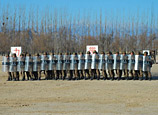
"Pay more or continue to freeze in the cold air," said one of 28 cabbies waiting outside a train station in downtown Xi'an. None of the drivers would start their engines unless passengers agreed to pay extra.
Chinese netizens have long complained about taxi services, grousing about long waits, exorbitant charges and poor service in general. Many believe the situation has worsened in recent years.
But the taxi drivers say they, too, are victims. Hefty franchise fees levied by taxi companies have left many drivers struggling with meager earnings, according to the cabbies.
Zhang said he and another driver who drive the same vehicle pay a total of 9,500 yuan (1,529 U.S. dollars) to a taxi company every month. He works at least 26 days a month, but makes an average of just 3,000 yuan in net income.
"I would've quit this job a long time ago if I didn't have to pay college tuition for my child," Zhang said.
The practice of having drivers register with taxi companies and pay monthly vehicle rental and management fees started in the late 1990s as city governments tried to regulate the market. In many cases, the cabbies have to purchase the vehicle and pay all operating costs on their own.
Industrial observers said the franchise mechanism is essentially a monopoly, with taxi companies demoralizing their drivers by levying excessive fees, leading to low driver morale and subsequent poor service.
"The companies sell their franchises after being authorized by the government and the entire process is conducted behind closed doors," said Yu Hui, a taxi industry researcher at the Chinese Academy of Social Sciences.


















 Why supervision on 'drug chicken' lacks intensity?
Why supervision on 'drug chicken' lacks intensity?


![]()
